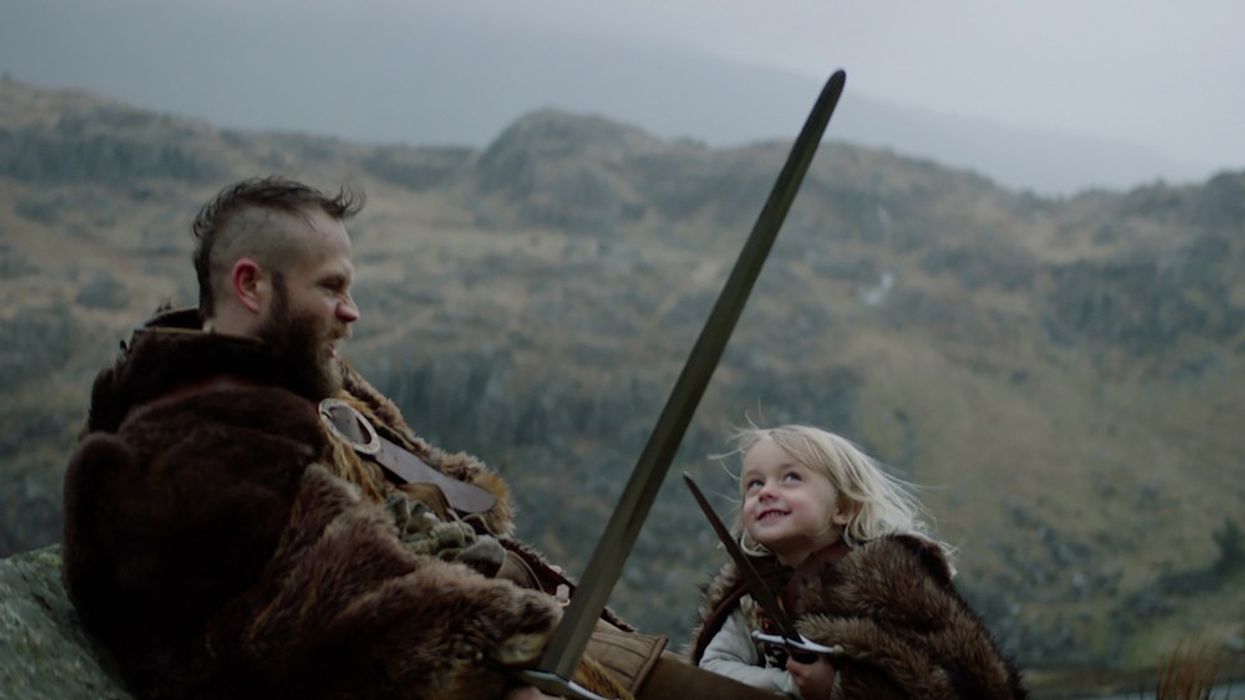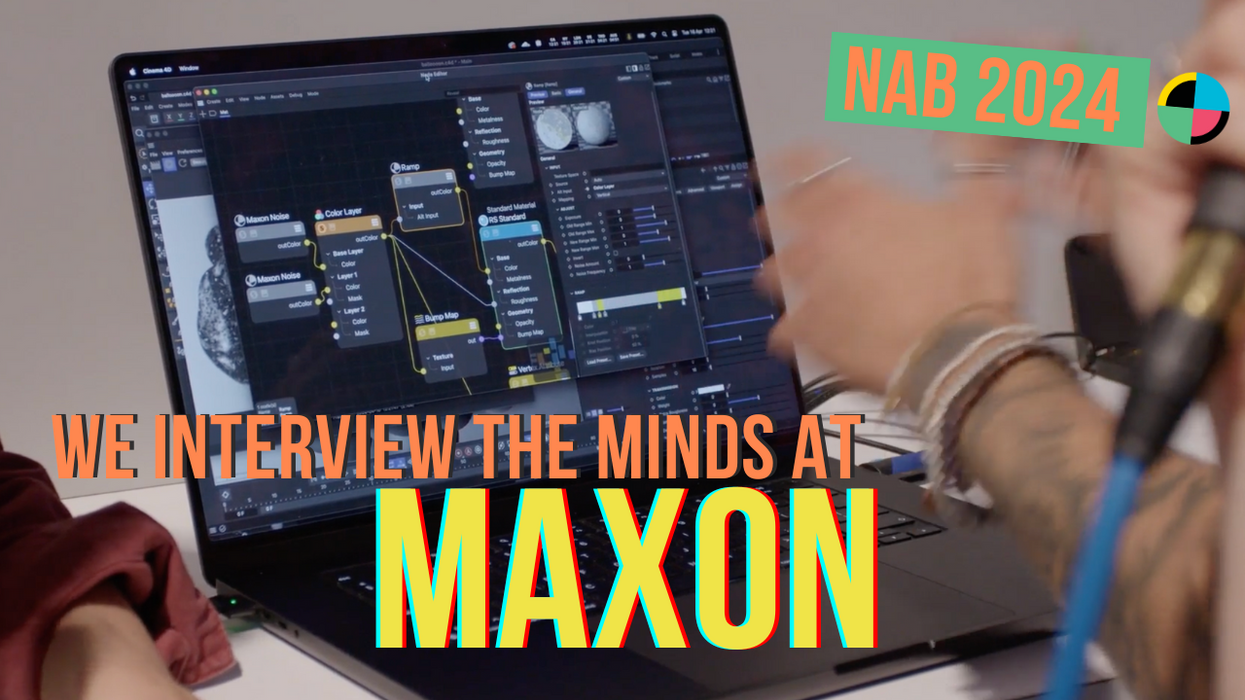Why This Tribeca Filmmaker is Disenchanted with Traditional Filmmaking
Here's how Mark Webber injected truth into his real-life fantasy film "A Place of No Words".

Mark Webber has acted in avant-garde films before, for directors such as esteemed as Lars von Trier, Jim Jarmusch, and Todd Solondz. But no matter how experimental the finished film, Webber is fed up with the traditional process of filmmaking. His own directorial method, which he calls reality cinema, is the answer to many years of frustration on set. It is primarily concerned with truth—conveying it, showcasing it, finding it, and questioning it. Webber's reality cinema positions a lack of resources as a strength, rather than a weakness. It embraces the docu-fiction hybrid form to create a flexible stage for the actors. Most of all, it rejects what Webber views as a rigid way of working in favor of something much more open-ended.
Webber's latest, The Place of No Words, premiered at the 2019 Tribeca Film Festival. It stars himself, his real-life partner, Teresa Palmer, and their toddler son, Bodhi. As in all of Webber's films, the family doesn't play themselves, per se; they play versions of themselves, responding truthfully and idiosyncratically to fictional circumstances. In The Place of No Words, Webber's character has just been diagnosed with a terminal illness. Bodhi has questions—a lot of them—but the one that animates the film is, simply, "Where do we go when we die?" A father and son go on a magical sojourn to a faraway land filled with creatures conjured from their shared imagination. They traverse medieval castles, frightening seas, and dramatic, mossy cliffsides in their Viking finest. In this fantasy realm, father and son encounter striking truths about love, fatherhood, the creation of meaning, and the outer limits of our own inner worlds.
No Film School sat down with Webber after his Tribeca premiere to discuss how reality cinema works—specifically, with a skeleton crew, a patient and resilient cinematographer, and a whole lot of time spent in the editing room.
No Film School: Your concept of reality cinema is fascinating to me. How did you conceive of it, originally?
Mark Webber: It started because I was a little disenchanted with the traditional ways of making a film. Coming out of being an actor on traditional film sets, I realized the way that this is all set up is not really conducive to fostering interesting work. Part of my challenges as an actor was trying to cut through the fact that we're making a movie in order to make a performance real or seem authentic. So it was birthed out of me being just a little uninspired with the traditional way of approaching acting in films.
I thought, "Why don't I create an environment that's totally different, that allows us to completely inhabit these characters around real-life situations?" And maybe, just maybe, I'll be able to really get real vérité on the screen. I wanted to show real emotions and real vulnerability. The type of movies that I respond to are the ones where I watch them and I'm like, "Something different is happening." I'm trying to do that by injecting a lot more truth into the storytelling process.

"I'm trying to inject a lot more truth into the storytelling process."
NFS: How is it that you inject truth into the storytelling process? How did your process change?
Webber: The first film I made in this reality cinema way was a movie called The End of Love that I premiered in competition at Sundance, in 2012. I learned a lot from that. I also developed some really rock-solid relationships with a few key collaborators. That really helped facilitate this process for me. I brought them along to the next picture that I did called Flesh and Blood. That was about my real mom and my real brother reuniting with my biological dad that I hadn't seen my whole life.
Pitching that, people would be like, "That's fucking crazy, you're nuts." People get really weird when you're attempting to do things that are so personal. They get worried: "How are other folks going to relate to something that's so personal?" But I want to use these things that are so personal as a way to amplify our overall human experience.
My process hasn't really changed that much; it's only just gotten stronger through developing really amazing relationships. My DP is this guy Patrice Cochet, who has shot all five of my features. And my producing partner, Dustin, literally does the work of 20 people rolled up into one person. It allows me to work in a down-and-dirty, unique way.

Webber: I know what each scene is going to be about going into it. And there's a full script, but a lot of the scenes and moments within scenes will be moments of improvisation.
NFS: Can you take me through a particular scene that you feel might have been different had you completely scripted it the traditional way?
Webber: Yeah! I mean, there's a really powerful sequence in the middle of the film—a voiceover from Bodhi. I was talking about me dying when that sequence was shot. I recorded it on the voice memo on my iPhone. That happened when Bodhi and I were really lying in bed, a good eight months after being done filming. Those were Bodhi's real emotions, being concerned about me dying. And this is just a regular moment in a typical five-year-old little guy's life where he's starting to contemplate mortality. That was a perfect example of pure vérité contextually thrown into the film. It becomes this anchor to make all the other scripted elements really sing.
"It's a really delicate balance between the scripted moment and also the scripted setups that allow pure truth to shine through."
Then, also, there are moments that were birthed out of me and Bodhi and our love for storytelling with each other. It's a really delicate balance between the scripted moment and the scripted setups that allow pure truth to shine through. It's hard to fully articulate what it is. It's kind of trying to capture lightning in a bottle. Sometimes things seem unscripted—like they're just happening—but they're really highly orchestrated. It's all a bit of magical madness that I really love and I crave.

NFS: You can really see that passion and enrichment from the process translate to the screen. Besides the performances and the personal elements, it comes through in the cinematography. The film was shot very intimately.
Webber: I love my DP Patrice so much. It's almost like we have telepathy at this point. When you have five features under your belt with the same collaborator, it's really powerful stuff. Patrice knows all my instincts. We share a lot of the same sensibilities; where we differ creates just the right amount of challenge, to continue to push each other to find the beauty in these organic moments.
It's almost as if you were shooting a documentary but then you're constantly re-staging. Bodhi and I really went on an adventure [like we did in the film]. We really threw on these Viking costumes and swords and we really walked through treacherous conditions and terrains. It takes a really patient, highly skilled person to be able to keep a camera up and filming this unique way.
Also, I shot a lot of sequences in the film myself. And so did my producing partner, Dustin, who is also my camera operator. We really go all in with this process. The moments I shot are of Bodhi because, you know, I'm his dad, I'm able to pull things off within his personal space that is a little bit more challenging for someone else.

Webber: He was totally acting. He was very much doing work. And he knew that. He understands what dad does and what mom does with their work—their art. I would have my conversations with him about the craft of acting and how you have words like "action" and "cut," and in between those words, you maybe have 30 seconds or a minute to try and achieve this thing that we want to get.
I like to empower everyone that I work with. And of course, to be able to empower my son—to be able to explore these artistic little quirks and sensibilities that we have—it's is so amazing. When you empower an artist, you're really creating an environment to let them explore and to let things come through in a unique way.
Bodhi is being himself, but within those moments of him being himself and allowing his truth to come through, there are these beautiful elements of straight performance. He speaks written lines but makes them feel like they're just coming out naturally. Those are things, thankfully, that I have been obsessing about for 20 years as an actor, so I have my little ways of imparting my wisdom on him about how to approach that stuff.
At the end of the day, this thing was built completely around Bodhi's moods and his feelings. So some days we would shoot for an hour and that's it, because that's all Bodhi could really tolerate. 'Cause first and foremost, I'm a dad, and we had to do some really challenging stuff. And so if anything was ever too difficult, "Well, we're done. We're going home. We're going to go play now."

NFS: How do you edit a reality cinema film?
Webber: They say movies are made three times: once when you write it, another time when you shoot it, and then you make it for real, finally, when you edit it. I really enjoy the editorial process, especially with this reality cinema stuff, because you're often putting together little clues and pieces and moments that are adding up to this kind of bigger equation.
The greatest thing about our process and working in a little bit of an unconventional way is that I take a lot of time in the editorial process. I develop a cut or sequence and sit with it for a really long time. And I observe my moods going into when I watch a particular sequence on a given day.
In the traditional process, you have four weeks to edit, two weeks to do the sound, and then it's locked and you can't touch it. I couldn't make these films in that way. These films really benefit from a lot of air and distance and time to reflect and observe. I'm always editing. And I always have the ability to just go out and shoot, too.

NFS: Can you talk a little bit about the incorporation of the magical, realist elements? I thought that was a really nice touch—it brings you into Bodhi's imagination.
Webber: Whenever I can conjure up a childlike sense of wonder, life is better. When I wake up and I'm like, "I got all this shitty stuff I gotta do today," I try to tap into that spirit and that wonderment that my children have, and bring that into my day. Things become a lot lighter.
It was those films like Willy Wonka and the Chocolate Factory, and Labyrinth, The Dark Crystal, and Goonies ... when I was a little boy, these movies made me want to go and make films. I just love fantasy in storytelling. In this film, it was so fun to go and try out these big cinematic tropes, language, and setups, but put my own spin on them.












